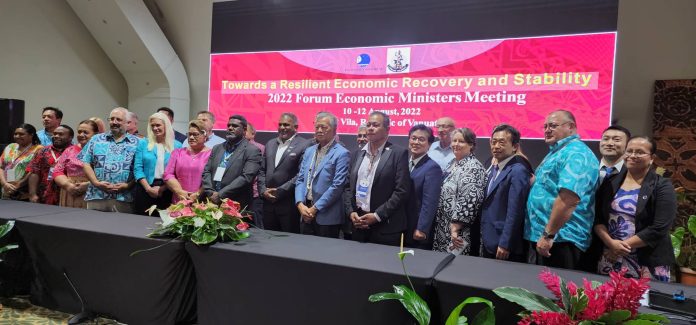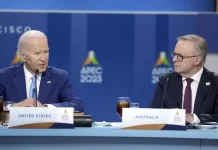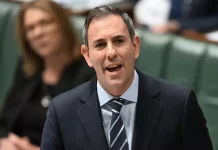Forum Economic Ministers have met with regional development partners in Vanuatu to call for greater financing and partnership to implement the 2050 Strategy for the Blue Pacific Continent, Pacific Resilience Facility, and other regional economic priorities.
In a FEMM 2022 roundtable event on 12 August, chaired by Vanuatu’s Minister for Finance and Economic Management, the Honourable Johnny Koanapo Rasou, partners around the table included China, the United States, the United Kingdom, Japan, France, South Korea, the European Union, the United Nations, Asian Development Bank, World Bank and International Monetary Fund.
Opening the roundtable, Minister Rasou highlighted the significant economic scarring from the COVID-19 pandemic, compounded by the existing climate change emergency facing the Blue Pacific. “We call on development partners to support the 2050 Strategy, plans to develop a Blue Pacific Economic Strategy and to fund the Pacific Resilience Facility, noting the urgent need to consolidate development and resourcing efforts to support the Pacific’s resetting of economic priorities.”
Secretary General of the Pacific Islands Forum, Henry Puna, emphasised the economic opportunity for the Blue Pacific as an oceanic continent. “At a regional level, we must aim to earn in real dollars, at least half of what our ocean is worth by the year 2050, so that we can break away from the bondages of debt, fund our own development, and be ready for rainy days.”
The dialogue provided FEMM heads of delegations with the chance to reiterate the importance of growth for Pacific economies through a new Blue Pacific Economic Strategy tackling employment, entrepreneurship, trade, and investment in the region to enable a return to work for those left jobless by the pandemic shutdown
Panelist Emma Veve, Deputy Director General at the Asian Development Bank (ADB) expressed support for the vision, direction, and scope of the 2050 Strategy. “It is not an easy task to come up with a single document which encompasses appropriate responses to the regional challenges the Pacific countries face across more than a 25-year period – and which acts to inspire and guide the region,” she said, noting the clear alignment between the strategy and ADB’s goal to support a resilient Pacific prepare for and respond to shocks, deliver sustainable services, and support inclusive growth.
Amanda Milling, Minister of State for Asia and the Middle East for the UK Government said “I congratulate you on the successful launch of the Blue Pacific 2050 Strategy. This is an incredibly important document which sets out the framework for development partners, like the United Kingdom, in which to focus their engagement in the years to come”.
Minister Milling said it was critical for donors increasing their financial support in the region, particularly in the areas of climate change, ocean and nature, to “coordinate and harmonise their engagement and ensure that it is country led. In addition, greater emphasis will be needed on monitoring, evaluation and adaptive learning to ensure that donor Blue Economy programmes are measured in terms of outcomes rather than just the inputs.”
Representing CROP regional organisations, the Director General for SPC Dr Stuart Minchin spoke of the need to bridge the gap between climate finance and the urgent resilience needed through on-the-ground investment, national budget support and flexible initiatives like the Pacific Resilience Facility, blue and green bonds, and debt swaps.
DG Minchin asked partners to consider direct investment into the region’s own modalities, such as the Pacific Resilience Facility, “rather than putting the majority of your pledges through global funds which our countries are not getting their fair share from. This will reduce transaction costs, tailor fiduciary requirements, declutter visibility for support, and incrementally build lasting capacity owned by the region for the region. In essence, it will help us bridge the gap between the elusive promise of climate finance and the urgent resilience needed through its investment on the ground.”
Forum Leaders first established the Regional Development Partner Roundtable linked to the annual Forum Economic Ministers Meeting in 2017, to strengthen partner funding and support for regional priorities.
SOURCE: PIFS/PACNEWS















